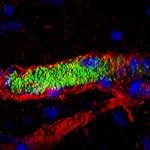Lien vers Pubmed [PMID] – 18072649
Bull. Acad. Natl. Med. 2007 Mar;191(3):475-92; discussion 492-3
Cardiovascular diseases continue to be the main cause of death in most industrialized countries. Endothelial dysfunction, a systemic process, is the earliest known marker of atherosclerosis and has become a major focus in acute ischemic disorders. We are investigating the hypothesis that, in these diseases, microvascular and endothelial dysfunctions occur simultaneously and precede the onset of macrovascular disease. We studied, to our knowledge for the first time in the same subjects, microvascular and endothelial functions in 11 patients with type 2 diabetes. 36 metabolic syndrome patients (NCEP-ATPIII criteria) and 25 young obese women matched with healthy controls. Micro vascular morphology and hemodynamics were evaluated non-invasively by means of nailfold videocapillaroscopy. Red blood cell velocity (RBCV, mm/s) was measured at rest and after release from 60 s of arterial occlusion (RBCVmax, mm/s) at the finger base, along with the time to reach RBCVmax (TRBCVmax, s), by video analysis with Cap Image software. Venous occlusion plethysmography was performed after intra-arterial infusions of acetylcholine and sodium nitroprusside to assess endo thelial-dependent and -independent vasodilation, respectively. We found similar results in the three groups of subjects, namely a significant decrease in RBCVmax, an increase in TRBCVmax, and a decrease in endothelial-dependent vasodilation. These findings clearly demonstrate that the two dysfunctions occur simultaneously in these groups of patients. Several mechanisms which could impair micro vascular and endothelial functions are associated with insulin resistance, and drugs that act on insulin resistance might thus be beneficial. Metformin, given to 16 first-degree relatives of patients with type 2 diabetes mellitus, who had the metabolic syndrome and normal glucose tolerance (ADA criteria), improved endothelial-dependent vasodilation and microcirculatory function. Rosiglitazone, given to 18 patients with the metabolic syndrome, enhanced vascular responses by improving endothelial function and increasing adiponectin levels. Increased triglyceride storage is often associated with insulin resistance, contributing to free fatty acid (FFA) overexposure. The two drugs tested here stimulate AMP-activated protein kinase, which promotes FFA oxidation and thus reduces oxidative stress, and might therefore attenuate endothelial lipotoxicity. The results strongly suggest that targeting micro vascular and endothelial dysfunctions in patients with metabolic disorders might help to prevent cardiovascular events, and warrant long-term clinical trials.

